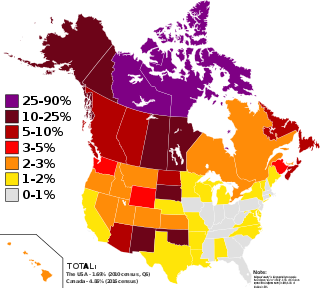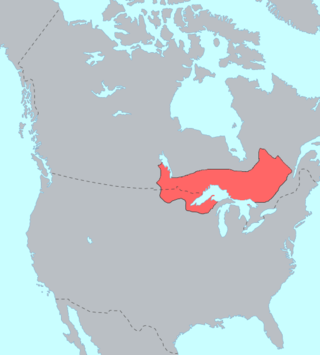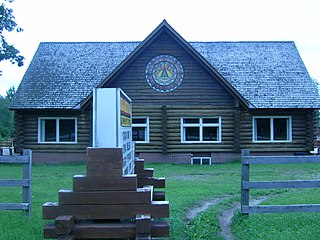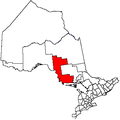
The Cree or nehinaw are a North American Indigenous people. They live primarily in Canada, where they form one of the country's largest First Nations. More than 350,000 Canadians are Cree or have Cree ancestry. The major proportion of Cree in Canada live north and west of Lake Superior, in Ontario, Manitoba, Saskatchewan, Alberta, and the Northwest Territories. About 27,000 live in Quebec.

Mississauga is a Canadian city in the province of Ontario. Situated on the western shore of Lake Ontario in the Regional Municipality of Peel, it borders Toronto (Etobicoke) to the east, Brampton to the north, Milton to the northwest, and Oakville to the southwest. Although Mississauga was initially a car-centric city, significant strides have been made to improve walkability and add cycling lanes, with most major arteries having bi-directional bike lanes. The city's downtown is home to several transit hubs, such as Square One Bus Terminal, and the City Centre Transit Terminal. With a population of 717,961 as of 2021, Mississauga is the seventh-most populous municipality in Canada, third-most in Ontario, and second-most in the Greater Toronto Area (GTA) after Toronto itself. However, for the first time in its history, the city's population declined according to the 2021 census, from a 2016 population of 721,599 to 717,961, a 0.5 per cent decrease.

Indigenous peoples in Canada are the Indigenous peoples within the boundaries of Canada. They comprise the First Nations, Inuit, and Métis, representing roughly 5.0% of the total Canadian population. There are over 600 recognized First Nations governments or bands with distinctive cultures, languages, art, and music.

The Ojibwe are an Anishinaabe people whose homeland covers much of the Great Lakes region and the northern plains, extending into the subarctic and throughout the northeastern woodlands. The Ojibwe, being Indigenous peoples of the Northeastern Woodlands and of the subarctic, are known by several names, including Ojibway or Chippewa. As a large ethnic group, several distinct nations also consider themselves Ojibwe, including the Saulteaux, Nipissings, and Oji-Cree.

The Mississaugas are a group of First Nations peoples located in southern Ontario, Canada. They are a sub-group of the Ojibwe Nation.
The minister of Crown–Indigenous relations is a minister of the Crown in the Canadian Cabinet, one of two ministers who administer Crown-Indigenous Relations and Northern Affairs Canada (CIRNAC), the department of the Government of Canada which is responsible for administering the Indian Act and other legislation dealing with "Indians and lands reserved for the Indians" under subsection 91(24) of the Constitution Act, 1867. The minister is also more broadly responsible for overall relations between the federal government and First Nations, Métis, and Inuit.
In Canada, an Indian reserve or First Nations reserve is defined by the Indian Act as a "tract of land, the legal title to which is vested in Her Majesty, that has been set apart by Her Majesty for the use and benefit of a band." Reserves are areas set aside for First Nations, one of the major groupings of Indigenous peoples in Canada, after a contract with the Canadian state, and are not to be confused with Indigenous peoples' claims to ancestral lands under Aboriginal title.

The Indian Act is a Canadian Act of Parliament that concerns registered Indians, their bands, and the system of Indian reserves. First passed in 1876 and still in force with amendments, it is the primary document that defines how the Government of Canada interacts with the 614 First Nation bands in Canada and their members. Throughout its long history, the act has been a subject of controversy and has been interpreted in different ways by both Indigenous Canadians and non-Indigenous Canadians. The legislation has been amended many times, including "over five major changes" made in 2002.

The Snuneymuxw First Nation is located in and around the city of Nanaimo on east-central Vancouver Island, British Columbia, Canada. The nation previously had also occupied territory along the Fraser River, in British Columbia.

The Métis are an Indigenous people whose historical homelands include Canada's three Prairie Provinces. They have a shared history and culture, deriving from specific mixed European and Indigenous ancestry, which became distinct through ethnogenesis by the mid-18th century, during the early years of the North American fur trade.

Fort Albany First Nation is a Cree First Nation in Cochrane District in Northeastern Ontario, Canada, within the territory covered by Treaty 9. Situated on the southern shore of the Albany River on the west coast of James Bay, Fort Albany First Nation is accessible only by air, water, or by winter road.

The Grand River land dispute, also known as the Caledonia land dispute, is an ongoing dispute between the Six Nations of the Grand River and the Government of Canada. It is focused on land along the length of the Grand River in Ontario known as the Haldimand Tract, a 385,000-hectare (950,000-acre) tract that was granted to Indigenous allies of the British Crown in 1784 to make up for territorial losses suffered as a result of the American Revolutionary War and the Treaty of Paris (1783). The Six Nations were granted the land in perpetuity and allege that lands were improperly sold, leased or given away by various Canadian governments, leaving only 5 per cent of the original lands under Six Nations control. The Six Nations also allege that monies owed to the Six Nations from leases and loans on much of the tract have not been paid or were redirected into government coffers.
The Pikangikum First Nation is an Ojibwe First Nation located on the 1,808-hectare (4,470-acre) Pikangikum 14 Reserve, in Unorganized Kenora District in Northwestern Ontario, Canada. The main centre is the community of Pikangikum, on Pikangikum Lake on the Berens River, part of the Hudson Bay drainage system; it is approximately 100 kilometres (60 mi) north of the town of Red Lake.
Mississaugas of the Credit First Nation is a Mississaugas, an Ojibwe sub-group, First Nation located near Brantford in south-central Ontario, Canada. In April 2015, MCFN had an enrolled population of 2,330 people, 850 of whom lived on the MCFN Reserve. The first nation governs the 2,392.6 ha parcel of New Credit 40A Indian Reserve known as Reserve 40B near Hagersville, Ontario. This reserve is located beside the Six Nations of the Grand River, near Brantford.

Garden River First Nation, also known as Ketegaunseebee, is an Ojibwa band located at Garden River 14 near Sault Ste. Marie, Ontario, Canada.

Nutashkuan (INAC) or Natashquan (CGNDB) is a First Nations reserve in the Canadian province of Quebec, belonging to the Première Nation des Innus de Nutashkuan band. The reserve is located on the north shore of the Gulf of St. Lawrence at the mouth of the Natashquan River, 336 km (209 mi) east of Sept-Îles and has been accessible by Route 138 since 1996.
Mingan, also known as Ekuanitshit in Innu-aimun, is an Innu First Nations reserve, at the mouth of the Mingan River, on Mingan Bay, on the Nort shore of the Gulf of St. Lawrence. It belongs to the Innu band of Ekuanitshit, geographically it is within Cote-Nord region, Minganie Regional County Municipality, Quebec, Canada.
Dokis 9 is a First Nations reserve and community in the Canadian province of Ontario, assigned to the Dokis First Nation. The reserve is located approximately 16 kilometers southwest of central southern Lake Nipissing along the French River. It is divided into two large parts consisting of a north island, Okikendawt, and a large southern peninsula. The two land masses, which are nestled within the flows of the French river, covers 154.36 square kilometers. The French River watershed in Northern Ontario was created more than ten thousand years ago when the last ice-age receded and left a maze of rivers and small lakes. The main settlement is found on Okikendawt island which can be accessed by a gravel road which connects with Highway 64. The Land is occupied by the Dokis and its cousin tribe, the Restoule‘s. The land is well known for its hunting, fishing, fur trades, and timber.

The Hiawatha First Nation is a Mississauga Ojibwe First Nations reserve located on the north shore of Rice Lake east of the Otonabee River in Ontario, Canada.

Indigenous law in Canada refers to the legal traditions, customs, and practices of Indigenous peoples and groups. Canadian aboriginal law is different from Indigenous Law. Canadian Aboriginal law provides certain constitutionally recognized rights to land and traditional practices.


















